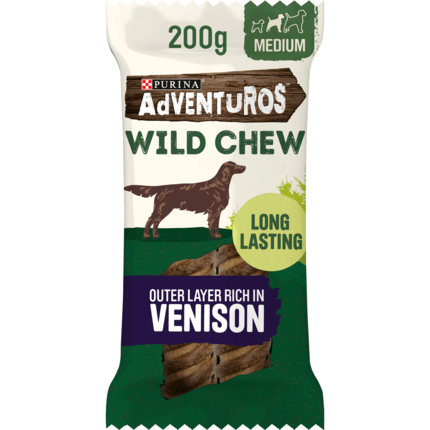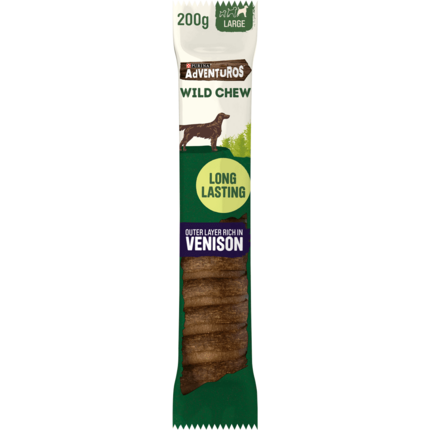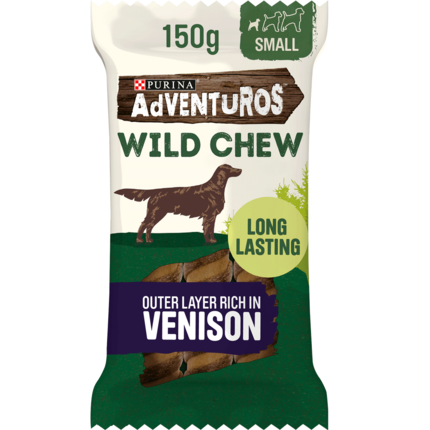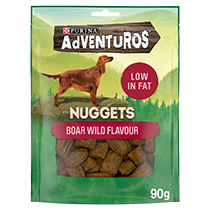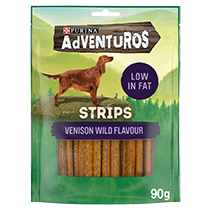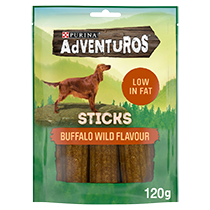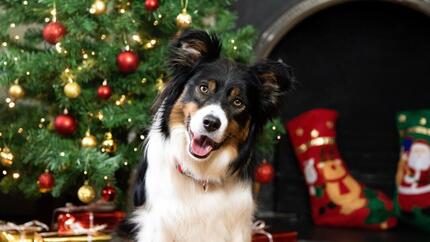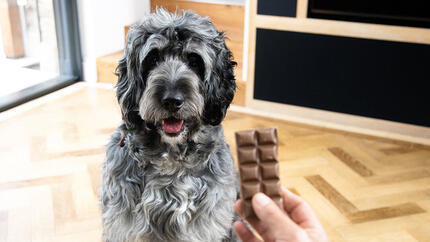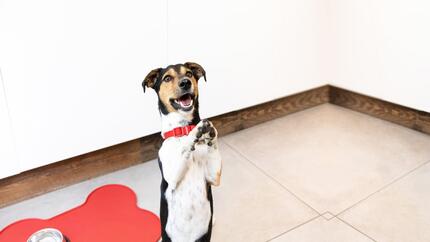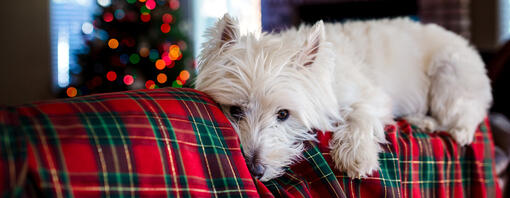
Christmastime is an occasion for fun and merriment for all the family – including your dog! But unfortunately, there are lots of potential dangers and stressors during your dog at this time. If you want to make sure your dog’s happy and safe this Christmas, read our guide.
The Christmas period is a time of great fun for all the family and that (usually) includes your dog too! There are many dogs who love to celebrate the holidays with us and spend all the time getting up to mischief – like sneaking your Christmas treats or collapsing the tree – and while this may all seem like good fun, the festive season can also bring a wealth of potential hazards that you’ll need to be on the lookout for.
With Christmas on the way, you may be wondering how to ensure your dog’s Christmas is just as merry as your own, which is why we’ve created this guide on keeping your dog safe and happy this holiday.
Dogs and Christmas trees
As you know, one of the biggest Christmas traditions involves bringing a tree into your home, and to your dog, this is a dream come true. Your four-legged friend will look at this tree and their eyes will light up at the thought of unlimited sticks to chomp and if you have a male dog, they may see it is as an excellent new spot to have a wee. Some pet owners will be lucky enough to own a pup that’s unphased by this new addition, but if you have a dog that just can’t resist, you’ll need a dog-proof Christmas tree. Here’s what to look for.
Fairy lights
One of the dangerous elements to dogs and Christmas trees are the twinkling lights wrapped around them. They may look harmless, but some dogs think of the wires as shiny new chew toys – which is most common with younger dogs or puppies. Also, if you have a particularly boisterous pup that likes to play, they may get tangled up in the wires.
An easy way to prevent your dog getting hurt by your Christmas tree lights is to cable tie any lose wires and then always disconnect from the mains when you go out. Alternatively, if you want to leave your lights on all the time, opt for battery operated ones instead and make sure that you place the battery pack in a place your dog can’t reach.
Baubles and hanging decorations
Another way to dog-proof Christmas trees is to make sure you’re only buying safe decorations. Avoid tinsel and angel hair on your tree as when consumed, they can cause a blockage in your dog’s stomach. Glass baubles are also a bad idea if you have a boisterous dog, as they may shatter which could potentially harm your pet. Instead opt for non-toxic plastic decorations.
If you have more expensive ornaments which are essential decorations for your tree, place them near the top of the tree where your dog and their wagging tail can’t reach them. Also, don’t put edible decorations such as chocolates or candy canes on the tree as they’re highly toxic to dogs and many won’t be able to resist.
Tipping the Christmas tree over
If your dog just loves to play with your tree, you’ll probably need a solution to stop it from crashing down in the middle of your living room. The best way to do this is to either purchase a weighted base or attach weights to be bottom to keep it safely in place. Alternatively, if you want to be extra safe, you can anchor it to your ceiling or wall instead.
Presents under the tree
Where a Christmas tree surrounded by wrapped presents with bows on top may be a wondrous sight, it may prove too great a temptation for your dog. Keep presents out of sight until the day, then always make sure your dog’s supervised with them – otherwise they may help themselves to a gift or two! Never put your dog’s Christmas presents under the tree either, they definitely won’t be patient and wait until the day to sniff out any tasty treats.
Are Christmas trees poisonous to dogs?
Yes, some fir trees produce oils which are mildly toxic and if ingested could cause your dog to vomit or excessively drool. Additionally, the sharp tips of trees bring an extra cause of concern as there’s a mild risk that if ingested, the needles can cause internal damage. However, it is rare for a dog to eat enough of the tree to cause any issues.
If you want to get a real Christmas tree, it’s best to opt for a non-drop variety because the loose needles can get stuck in your dog’s paws which can be very painful. Also, due to the mild toxicity of some Christmas trees, it’s best to place it in a separate room in the home where your dog won’t be able to access it when they’re unsupervised.
Other dog Christmas hazards
It’s not just the Christmas tree that can be a hazard during the festive period, but there’s plenty of other things you need to watch out for too.
Christmas foods
There’s lots of Christmas foods which are poisonous or toxic to your dog, including chocolates, grapes, sultanas and raisins (present in Christmas puddings and mince pies). A lot of dog owners think feeding them a bit of chicken or turkey is a nice gift, but these scraps can contain tiny bones which are dangerous – always check the meat thoroughly before feeding to your dog. If you want to give your dog Christmas dinner, read our article for information on what you can and can’t include.
Festive flowers
Festive plants and flowers look stunning in our homes, but unfortunately a lot of these plants are toxic to dogs. Poinsettia which is used in many wreaths and arrangements can cause stomach and mouth irritation, while holly and European mistletoe berries are also toxic and can cause stomach upset. American mistletoe on the other hand is highly poisonous. Additionally, ivy which is commonly used in wreaths can cause sickness and skin irritation like contact dermatitis.
Christmas crackers
Christmas crackers are a staple of festive get-togethers, but loud sounds can be very frightening for your dog.
If you’re setting these off, it’s a good idea to put your dog in another room or the garden. Also, be wary of little items that fly out of your crackers, which can end up on the floor where your dog may eat them.
Visiting friends and family
It’s likely that you’ll have plenty of friends and family visiting over the holidays and this can be quite overwhelming for your dog – particularly if they’re not used to it. Make sure you provide them with a space away from it all, put down blankets and provide them with food and water. That way if they feel stressed from all the merriment, they can go to their quiet space.
How to stop your dog from biting guests at Christmas?
Christmas – or any winter festival of lights and merriment – is a magical time for everyone. Friends and family get together to share food, wine (often lots of wine!) and exchange presents. Children are excited, adults are often wildly distracted trying to make everything perfect for the family, and the house is full of strangers eating drinking and being very merry!
Despite all this fun and enjoyment, this is the time of year when the majority of dog bites in the home occur – and in most of these cases the victims are young children.
Why dog bites happen more often at Christmas time?
With a little bit of thought, it isn’t difficult to see why – and thankfully with this knowledge, it is easy to prevent and to make sure everyone has a happy Christmas.
Firstly, the children are all at home (and are often in the house with lots of their friends that your dog might never have met before) – and not only that, they might well be wildly excited. Christmas is coming!
Your dog’s usually predictable home has become a scene of upheaval. There are things everywhere, tinsel and glitter seem to cover everything, and more to the point, someone has brought in a tree - and unlike any other tree, the dog is forbidden from touching it, chewing it - and weeing on it appears to be a very definite no-no!
There are unexpected visitors to the house – and while the children really wish Auntie Maud wouldn’t kiss and hug them, that’s nothing compared to the dog’s view on this!
And to cap it all, the weather isn’t great – and so the dog is probably getting less physical exercise than usual – especially as in their panic to make sure everything is ready for the big day, the adults seem to be running around doing all kinds of things that don’t include the dog, or even seem to remember the dog exists.
Most well-socialised family dogs can cope with the temporary craziness of Christmas – and many actually enjoy it – but for a surprisingly large number it’s stressful and worrying. Dogs like routine and predictability but in the Canine Nightmare Before Christmas scenario, the dog is under-exercised, over stimulated, under-supervised and over-threshold. An accident just waiting to happen.
How to prevent the dog from biting?
So how to make sure you all have a merry Christmas?
1. Remember your dog’s needs don’t stop for the festive season.
Make sure they get enough exercise, stimulation – and indeed your attention – as they do at every other time of the year… no matter how busy you are. You signed up for 24/7 dog ownership and this includes Christmas!
2. Try and keep your dog’s routine the same as always.
It’s easier for a dog to deal with the unexpected if they have predictability the rest of the time.
3. Supervise all interactions between children and dogs.
This goes for both your own children and strange ones. If you can’t, use baby gates to keep them separate – or just keep the dog with you. Make sure you know where everybody is - no matter how hard it can be to keep track!
4. Watch out for any signs your dog might be getting stressed.
Dogs can’t tell you when they are beginning to feel worried or anxious, so you need to watch for those tell-tale body language cues. This might be subtle signs such as licking their lips or yawning – or it might be more obvious signals such as tension, looking worried, lowered body language or attempts to hide or just remove themselves from the chaos.
5. Don’t let anyone – child or adult – handle your dog roughly or inappropriately.
No grabbing, hugging or rough play. This is especially important when alcohol is involved as from a dog’s point of view, drunk people behave very unpredictably. Also when people are the wrong side of a sherry or two, they don’t read dog body language very well (if they ever could) and often overstep canine boundaries.
6. Have a ‘safe space’ for your dog where they can go and not be disturbed.
Use this space anytime things get chaotic, noisy – or you just can’t supervise your dog – and make sure the dog has a special treat to make their ‘den’ feel special and not as if they are locked away from the fun.
Perhaps the most important thing you can do however is make sure you have some ‘dog time’ every day. Time where you forget about the madness of the season and you just focus totally on your dog, making sure you give them what they need to be healthy and happy. This is the very best Christmas present you can give you dog - your time and your love.
Note: If you have any concerns that your dog may behave aggressively to family members or visitors, consult a qualified and experienced behaviourist for help.
That’s our guide to making sure your dog’s Christmas is a safe and happy one. Do you have a cat too? Read our article on Christmas safety for cats next.





